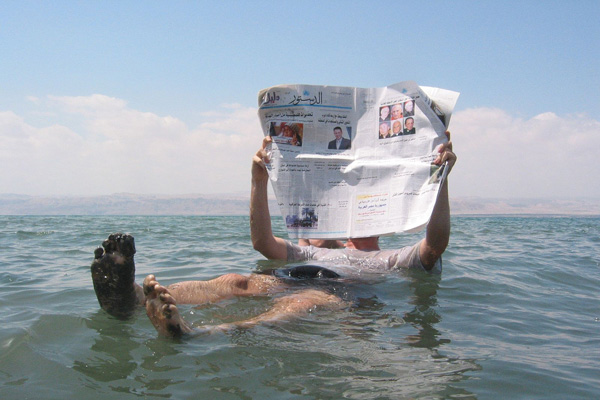Pumping Red Sea water into the Dead Sea to save it from drying up ignores environmental consequences, experts warn. Rights groups decry the plan as an ‘attempt to force the Palestinian population to consent to their own dispossession.’
By Keren Simons

Israel and Jordan last Thursday signed a historic agreement to cooperate over their shared bodies of water, in a move to protect the shrinking Dead Sea and to address the looming potable water crisis in the two countries. A pipeline from the Red Sea to the Dead Sea is proposed to refill water in the salt lake, and desalinization plants to be built in Jordan. The Palestinian Authority, a party to the Memorandum of Understanding on replenishing the Dead Sea in December 2013, was not a party to this agreement. The World Bank sponsored this long-awaited plan, hailed as an initiative to promote peace in the region through economic and environmental cooperation, on the understanding that environmental problems have no borders.
The Red-Dead conveyance, however, is far from a perfect plan. Environmental groups have argued that the World Bank environmental impact study does not adequately address serious concerns about the effect on ecosystems in both the Red and Dead seas, nor did it consider alternative proposed plans. Palestinian human rights groups have maintained that the plan is part of a continuum of violations of Palestinian rights to water. MK Silvan Shalom implied the plan was another element to realization of the Zionist dream, saying, “today we realize the vision of Binyamin Ze’ev [Theodore] Herzl, the visionary of the state, who already at the end of the 19th century understood the need to revive the Dead Sea.”
Palestinian rights groups state that the World Bank’s feasibility study and Environmental and Social Assessment study lack transparency, or a mandate given to them by a credible consultative and participatory process. They allege that key concerns brought up by Palestinians on Israeli violations of water rights were deliberately ignored.
The Dead Sea is not actually a sea, but a hypersaline lake, naturally replenished by water flowing into it from the Jordan River. The Jordan, however, has been overexploited, polluted, and diverted, with large parts of the lower river in serious danger of drying up. An estimated 98 percent of the trans-boundary Jordan River has been diverted by Israel, Jordan and Syria for public use before it can ever reach the Dead Sea.
Largely as a result of this, and of the unsustainable mineral extraction activities by Jordan and Israel, the water level of the Dead Sea has dropped dramatically at an average of one meter per year, and the salt lake has split into two separate pools. The receding coastline has led to the formation of dangerous sinkholes in the area. The Red Sea-Dead Sea conveyance project does not address any of these causal factors, instead planning to pipe water from the Red Sea, 180 kilometres away, into the Dead Sea.
Environmental scientists have questioned the reasoning for this, given that this plan does nothing to reverse the damage done to the Jordan River. Additionally, the waters of the two seas are entirely different from each other and the impact of this mix is yet unknown. The introduction of Red Sea water risks layering the waters, leading to the growth of gypsum crystals and algae in the Dead Sea. This could have devastating consequences for Dead Sea preservation and the region’s ecosystem, affecting the health benefits of this heritage site and, consequently, the tourist industry. Another issue is the impact the pipeline may have on the ecosystem of the Red Sea, as coral reefs are highly sensitive to a change in currents, which the pipeline redirection may cause.
Chairman and Jordanian director of Eco-Peace Middle East Munqeth Mehyer noted that the current plan is very different from its original incarnation, and is now more of a desalination project than Dead Sea conservation. To pump “100 million cubic meters of water is an insignificant amount to the actual needs of the Dead Sea,” he said, “especially when there are indications that increasing that much brine will create environmental problems. It is not worth the risk of laying that pipeline and all that money [estimated at $900 million] for such a small amount of water.” It would be more advisable, he explained, to redirect the enormous sum of money to cleaning up the Jordan River, the original source of water to the Dead Sea: “We should not play with nature in this way. The Red Sea is not the right source.”
A feted accomplishment of the agreement between Israel and Jordan is the desalination plant to be constructed in Aqaba, Jordan, a possible solution to water shortages and job creation. This involves a plan to sell desalinated water to the Palestinians, although this would be part of a separate agreement with the Palestinian Authority. In a joint statement in October 2013, Palestinian NGOs expressed their emphatic rejection of the Red-Dead plan as “an unacceptable attempt to force the Palestinian population to consent to their own dispossession.” Israel controls most of the water sources in the Jordan Valley, and Palestinian access to water is restricted and inadequate. Given that the plan does nothing to address the damage to the Jordan River, or to the rapidly depleting Eastern Aquifer, one of the only water sources on which West Bank Palestinians can depend, Palestinian rights groups view the Red-Dead project as an endorsement of the status quo and persistent impunity that accompanies Israel’s inequitable control of water sources in the West Bank.
Keren Simons is an international development professional currently based in London after four years in Israel – Palestine. Tweet @SimonsKeren. Thanks to the Thirsting for Justice Campaign for contributing information.
